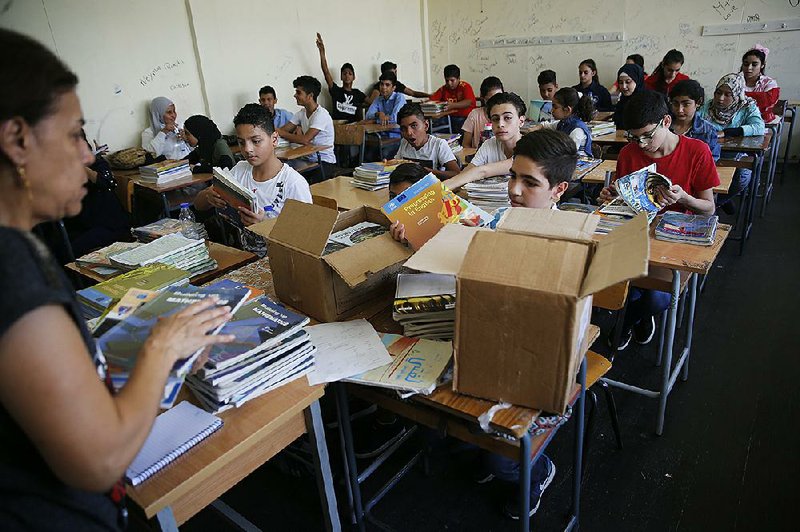JERUSALEM -- The United States ended its funding for the U.N. agency supporting Palestinian refugees for political reasons related to the peace process, its commissioner said on Monday, but he expressed confidence that the $200 million shortfall would somehow be fixed.
Pierre Krahenbuhl, the commissioner general of the United Nations Relief and Works Agency for Palestine refugees, also rejected U.S. criticism that the organization only perpetuated the refugee problem by creating an ever-expanding population of beneficiaries.
Since its establishment in 1949, the United States has been the single largest donor to the agency, which originally offered humanitarian support to some 750,000 Palestinians, the initial number of people displaced when Israel was created in 1948.
Today, the $1.2 billion agency provides education, health care, food support and other essentials to some 5.3 million Palestinians, descendants of the original refugees, now living in the West Bank, Gaza, Jordan, Lebanon and Syria.
In its statement ending the funding, the State Department criticized the "expanding community of entitled beneficiaries" served by the program.
"We have to set the record straight, it is just false and wrong to describe things in that manner," Krahenbuhl said by telephone from his office in Amman, Jordan. "There is only one thing that perpetuates the situation of refugees, including Palestinian refugees, and that is the extraordinary failure of the international community to bring about a just and fair and inclusive solution to the conflict."
He added that the agency's mandate is no different to the broader U.N. refugee agency, which also deals with "refugees, their children and their grandchildren."
The U.S. withdrawal leaves the agency with a $446 million shortfall, Krahenbuhl said. The deficit has already been partially filled by the European Union, Japan, India, Qatar, Saudi Arabia and the United Arab Emirates, he said, indicating that the agency will survive the U.S. pullback at least for now.
"The situation still remains critical but I hope we will overcome the remaining $200 million debt," he said.
Krahenbuhl said the United Nations Relief and Works Agency is certainly open to criticism but since Washington's initial announcement about reducing its contribution in January, he had never been given a "consolidated position on the reasons for it."
"This has led me to believe that this decision was made for political reasons as part of the tensions between the U.S. and Palestinian authority. There is nothing that UNRWA can do about this," Krahenbuhl said.
President Donald Trump's administration has been preparing to present its own peace plan to solve the long-running Israeli-Palestinian conflict, but its team of special envoys has been struggling to meet with members of President Mahmoud Abbas's Palestinian Authority.
The Palestinians say Trump's December announcement recognizing Jerusalem as Israel's capital and his decision to upend decades of U.S. policy by moving the embassy from Tel Aviv to Jerusalem has exposed its pro-Israel bias and made it unsuitable to act as a mediator.
"This is the art of negotiation? His negotiations have put me in a position where I have nothing to lose. Why should I talk to them?" said Saeb Erekat, secretary general of the Palestine Liberation Organization, in an interview Friday. "They have disqualified themselves from any role in the peace process and destroyed all prospects of peace."
According to a report Monday in Israeli newspaper Haaretz, Trump's peace team, which includes his son-in-law Jared Kushner, laid out for Abbas a peace plan that would create a Palestinian-Jordanian confederation.
"I was asked if I believe in a federation with Jordan," Abbas told Israeli lawmakers at a recent meeting about a talk he held with Kushner and Trump's Middle East envoy Jason Greenblatt. "I answered: Yes, I want a confederation with Jordan and Israel. I have asked the Israelis if they would agree to such an offer."
Abbas also said he believed that the "U.S. wants to completely sabotage UNRWA."
In Israel, the U.S. position on the agency has been welcomed by Prime Minister Benjamin Netanyahu, challenging the long-held position of the country's security establishment, which believes that weakening the aid agency could have negative consequences on the stability of the region.
A Section on 09/04/2018

